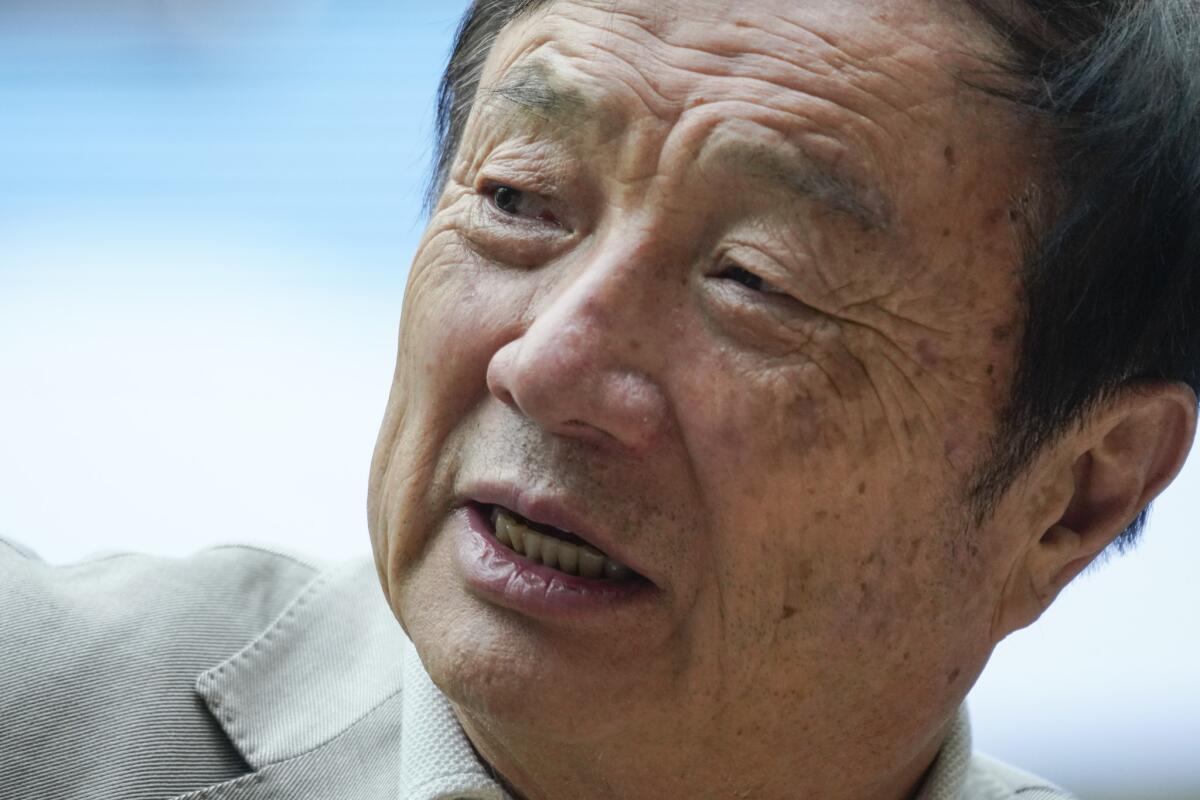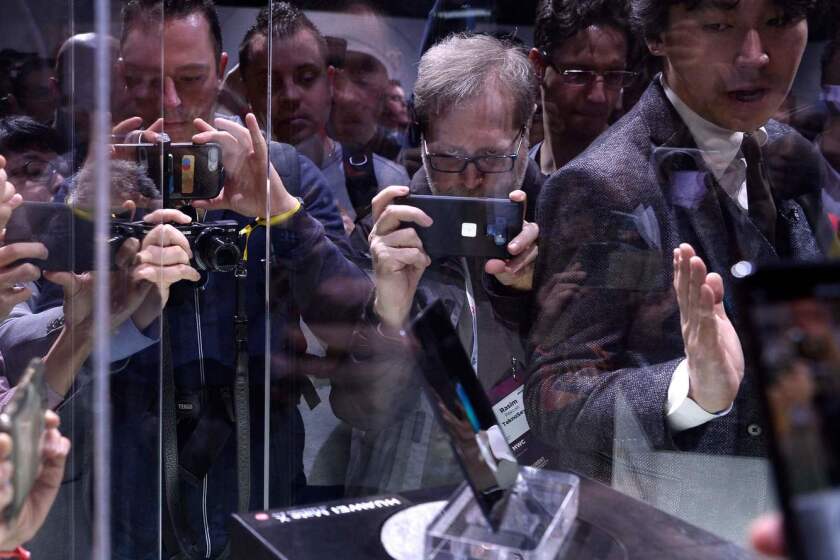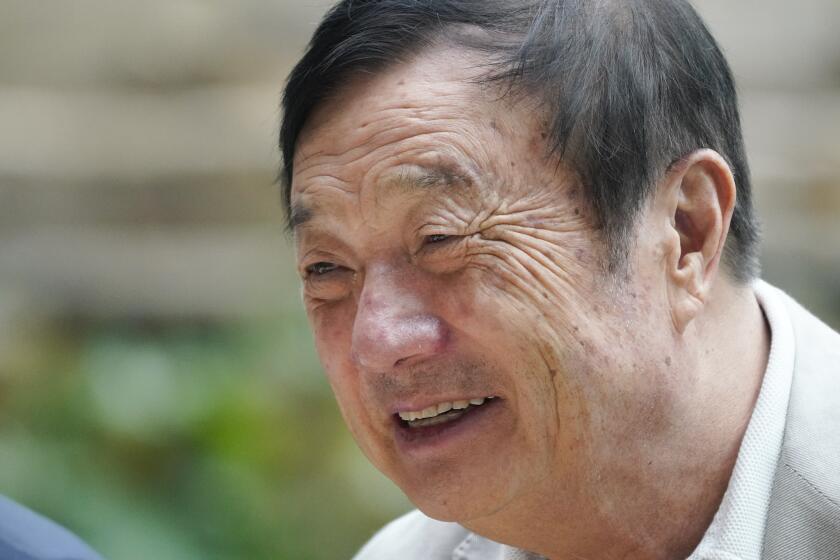‘We were fighting for survival’: How Huawei is enduring America’s war against it

“Heroes are forged, not born,” proclaims the Huawei poster, depicting a World War II Russian plane, still flying despite being riddled by antiaircraft and machine gun fire.
The same is true for Huawei Investment & Holding Co., says its founder, Ren Zhengfei. Although Huawei has been bloodied by America’s unprecedented and relentless efforts to destroy it, Ren seemed confident, during a recent visit to Huawei’s headquarters here, that China’s largest smartphone and telecom manufacturer would remain formidable and resilient.
With the U.S. threatening to ban American hardware and software providers from doing business with the company, Huawei has attempted to stockpile chips and scramble the development of its own operating system. It has countered federal indictments in New York and Seattle with civil suits of its own in Dallas and New Orleans. The battle has extended to six continents, where Huawei’s 196,000 employees operate in more than 170 countries. Governments that would prefer not to choose sides may ultimately have no choice but to do so.
When The Times first interviewed Ren in March, he and his company seemed uncertain about how best to counter the U.S. onslaught. Huawei had prospered by eschewing publicity in the 32 years since Ren launched it from a two-room office. But with annual revenues topping $109 billion in 2018 — putting it ahead of many multinational tech firms, including Microsoft, Siemens and IBM — silence, increasingly, invited suspicion, especially in Washington.
China has come to be viewed as a Cold War adversary by the Trump White House, by a bipartisan coalition of Republicans and Democrats in Congress, and by intelligence community hawks. They all see Huawei as a pawn and partner of China’s military, its government, and the Communist Party — resurgent under President Xi Jinping — well-positioned to support China’s quest for global dominance.
Although Ren had portrayed Huawei as a company that would always protect its customers, even if it meant standing up to government pressure, he recognized that public opinion outside China was turning against Huawei. So, the 75-year-old founder launched a personal charm offensive. As of last month, when The Times had a second lengthy interview with Ren, he had met with more than 3,000 foreign journalists and executives.
“We were fighting for survival,” he said. “We had to tell the world who we really are.”
Why the U.S. is trying to destroy China’s most successful brand
For many years Huawei’s accusers focused primarily on alleged theft of intellectual property. More recently, however, Huawei’s lead in developing 5G, an important new telecom technology, has prompted national security concerns. Since information sent across Huawei networks would most likely pass through Huawei base stations, the U.S. feared it would give China control over other countries’ banking, electricity grids, transportation and other essential services.
“Whoever provides the technology for 5G networks will be sitting in a position of incredible access and, thus, power,” a group of researchers concluded in a report recently published by Lawfare, which covers national security. “All data sent and received from a mobile device, smart home or even a car will pass through a network built with Huawei devices. These devices will be remotely controlled and updated,” greatly expanding opportunities for attacks.
National Security Advisor Robert C. O’Brien has called Huawei a “Trojan Horse” that will have the ability to give China access to every citizen’s health and banking records.
In June, Finite State, an Ohio research firm specializing in cybersecurity, issued a lengthy report — disputed by Huawei — concluding that “Huawei devices pose a quantifiable high risk to their users” and that a majority of the products analyzed had at least one “backdoor” problem that could potentially compromise product security.
“In light of all this, it seems to some of us to be nothing less than madness to allow Huawei to worm its way into one’s next-generation telecommunications networks,” says Christopher Ashley Ford, the State Department’s assistant secretary in the Bureau of International Security and Nonproliferation.
Ren Zhengfei turned a company with no intellectual property into the world’s largest telecom and made China a global leader in 5G technology.
Though a total decoupling of Chinese and U.S. technologies seems for the first time like an actual possibility, many trade experts and corporate CEOs worry that companies and industries in both countries would suffer should each side push for much greater self-reliance.
“We do need to hold China accountable,” says Mickey Kantor, a Los Angeles-based international lawyer who served as U.S. trade representative and then secretary of Commerce in the 1990s under President Clinton. “But it is in the interest of both countries to work together. We can compete on trade even as we create a peaceful duopoly that can benefit both sides for the rest of the 21st century.”
Last month Bill Gates urged the U.S. and China to embrace each other’s innovations because it is “crazy” to do otherwise. Gates, the philanthropist and Microsoft co-founder, was speaking at a New York Times Dealbook conference where he said that mutual dependence minimizes the chance the U.S. and China will ever go to war with each other. While Huawei might be able to compromise an adversary’s infrastructure with a software patch containing malware, Gates said, jet engines exported to China from the U.S. could be similarly disabled.
Gates, who set up Microsoft research and engineering centers in China more than 20 years ago, said Huawei can allay suspicions by sharing its 5G source code.
Although most tech companies try to keep source code and other proprietary technology secret, Ren confirmed in an interview with The Times last month that he was willing to license to a U.S. company all of Huawei’s technology, including its source code, designs for hardware, manufacturing techniques and 5G patents.
Official Washington has shown little interest in Ren’s offer or in following Gates’ advice.
The U.S. Commerce Department placed Huawei on its Entity List in May, prohibiting U.S. firms from exporting sensitive items to it. Since then, the list has been expanded to include Huawei affiliates and subsidiaries. Implementation of the bans has been postponed several times in an effort to limit their effect on rural U.S. phone companies that had bought Huawei equipment. But the threatened bans have nonetheless had a chilling effect on many of Huawei’s U.S. suppliers including, most notably, Google’s parent, Alphabet Inc., whose Android mobile operating system has powered most of Huawei’s smartphones.
Secretary of State Michael R. Pompeo has warned that Germany and other NATO countries that allow the purchase of Huawei technology and products run the risk that the U.S. won’t share intelligence information with them.
Australia, New Zealand and Japan have all agreed to restrictions on Huawei’s 5G equipment, while the British and German governments, initially favoring the purchase of Huawei equipment, now seem less willing to move forward. In contrast, however, Telefonica Deutschland, the large German mobile subsidiary of Spain’s Telefonica, announced this month that it would be purchasing 5G equipment from Huawei.
Sens. Marco Rubio (R-Fla.) and John Cornyn (R-Texas) have introduced legislation that would prohibit Huawei from using U.S. courts to enforce any of its more than 11,000 patents held in the U.S. The legislation was proposed shortly after Reuters reported that Huawei had asked Verizon for more than $1 billion for use of hundreds of Huawei patents.
China has retaliated by ordering all its government offices to remove foreign computer equipment and software within three years, the Financial Times reported Dec. 9. And Danish publications reported two days later that the Chinese ambassador to Denmark had threatened to abrogate trade agreements with the country’s Faroe Islands if they refuse to purchase a 5G network from Huawei.
Last month the Federal Communications Commission, citing threats to national security, voted to ban U.S. companies from using a subsidy program to buy Huawei equipment. Huawei quickly countered with a suit alleging that the FCC’s action was unconstitutional.
Meanwhile, Ren’s daughter, Meng Wanzhou, who is also Huawei’s chief financial officer, remains under house arrest in Vancouver, Canada, while she fights extradition to the U.S. on charges that she violated U.S. sanctions against Iran. Ren says his daughter is innocent and is a pawn in the U.S.-China trade war. (Shortly after her arrest, President Trump told Reuters he would intervene in her case if doing so would lead to a better trade deal with China. But there was no indication that Huawei gained anything from the new U.S.-China trade agreement.)
A second indictment, unsealed in January, charged Huawei with stealing an industrial robot from T-Mobile. Huawei has rejected the charges, noting that it and T-Mobile had settled a civil suit containing similar allegations several years before the indictment was unsealed.
News of America’s attacks on Huawei prompted a patriotic response among many Chinese, who switched to Huawei from Apple and other imported smartphones, Ren said. Huawei also has paid most of its employees bonuses called Special Awards for Striving, equal to a month’s salary. The incentive plans have paid off: Strong sales in China more than offset weakness in overseas markets. As a result, Huawei revenue for the nine months that ended Sept. 30 was up more than 24%.
“After the U.S. added Huawei to the Entity List, we felt it necessary to tell the world who we really are, and for some people in some areas, Huawei’s image has somehow improved,” Ren says. “The Entity List also created a crisis for our employees because they realize that they will go down with Huawei if they don’t work hard.”

Huawei has also threatened to cut imports from the U.S., which totaled more than $11 billion in 2018. Huawei executives have hinted that the company will soon be able to produce smartphones without any U.S. chips. They say, however, that Huawei will have trouble finding developers whose applications will be good enough to supplant Android-based apps available in the Google Play Store.
It’s been 62 years since the U.S. last confronted a strategic competitor whose technology threatened the country’s belief in American exceptionalism. With the launch of Sputnik — the first Earth satellite — the Soviet Union took an early lead in the space race. In that case, fear replaced complacency, and Americans put their political and other differences aside. With unity of purpose, the country quickly overcame the Soviets’ lead.
These days America’s politicians, as well as its leaders in government, industry and the military, seem unified in their intent on tearing Huawei down. There is little to suggest, however, that there is similar interest in forming an alliance to produce a homegrown 5G competitor.
“It’s time for an honest assessment of how our government has let our innovators and businesses down,” Henry M. Paulson Jr. wrote in the Washington Post a few days ago. “Erecting an economic iron curtain, as some policymakers are calling for, won’t halt Beijing’s progress — nor will it energize ours. Washington needs to focus not simply on trying to slow China down, but on accelerating efforts at home.”
Should Ren prove right, and Huawei manage to dominate the global 5G market despite America’s war against it, that would say as much about Chinese inevitability as it does about American protectionism.
Times staff writers David Pierson and Max Lu contributed to this report.









